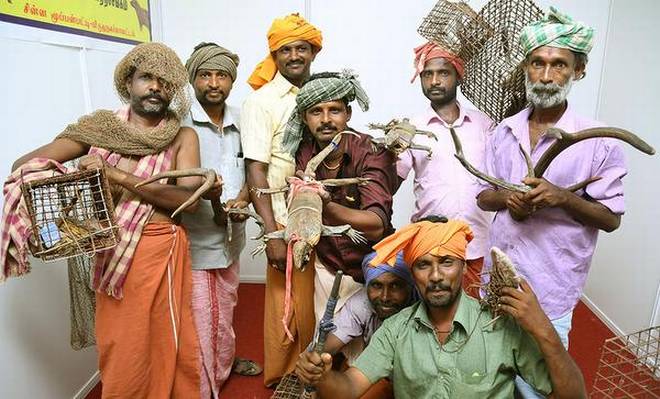Healers, fortune tellers and drummers from 18 tribes of Tamil Nadu came together to showcase their talent in the city
Medicine men, fortune tellers, hunters and many more gathered at the festival titled Pazhangudi Naadham organised recently by Tribal Research Centre, at Kalaivanar Arangam.
The centre, which comes under the Ministry of Adi Dravidar and Tribal Welfare, Government of Tamil Nadu and Ministry of Tribal Welfare, Government of India, brought together 18 communities living in Tamil Nadu, identified as scheduled tribes, to celebrate their identity and culture.
“Pazhangudi Naadham is the first tribal festival organised in the State of Tamil Nadu. There is no other common platform to showcase the culture and heritage of the scheduled tribes of Tamil Nadu,” says P Subramaniam, director, Tribal Research Centre, Udhagamandalam. He adds, “We therefore hope to make this an annual event going forward.” He says that the festival will eventually unite 36 tribes and be a place for them to interact with other tribal communities, even as they present their dance forms, music and art to the public. “We encourage them to preserve their unique traditions. They can also voice their grievances on this platform,” says Subramaniam.
There are stalls, showcasing everything from animal traps to herbal medicine. Meanwhile, in the spacious auditorium, the men from the Malayali tribes from Chinna Vattanur (in the Jawadhi Hills region, near Salem) perform an energetic sevai attam. Draped in white veshtis and shirts, with a bright yellow sash on their foreheads, they wear heavy brass anklets and dance to the beat of the traditional urumi and melam.
Keeping pace
“Our tribes are predominantly agriculturists. We dance for 10 nights during the harvest festival of Pongal. It is called Sevai, because it is a form of thanksgiving to God for the abundance of agricultural produce,” says Kadhiresan from Chinna Vattanur. Standing beside the busy stalls, Ayyanar Amma beckons visitors to listen to her predict their future. She belongs to the Kaatunayakan tribe and has travelled from her village, Pappa Oorani, near Karaikudi. “Our men are hunters. We are nomads and for six months of the year we travel across the State,” says Ayyanar. She adds that the women invoke their deity, Kondanayakamman before they tell fortunes.
As she talks, the men from her tribe gather around. Traditionally they hunted deer, rabbits and kaatu poonai (wild cats) across the forests of Tamil Nadu. “We hunt for small animals that we make a meal of, but never kill big wild animals,” says A Senthil, who now works as an agricultural labourer. He adds, “Our womenfolk travel with us. When we visit small towns they make money as fortune tellers.”
Roots and herbs
The men say that when hunting was banned by the Government they were forced into agricultural labour. However, they are still strongly connected to their roots, they add, proudly holding up handmade cages with preserved specimens.
There’s the furry tail of a wild cat, skin of a crocodile and majestic set of deer horns. As they return to their stall, they display these to onlookers, inviting them to touch and feel. Meanwhile tribal medicine man, D Raja from Kolathur, in Mettur Taluk, Salem sits behind an intriguing array of dried herbs. He claims to have a remedy for almost all kind of illness, from insect bites to skin infections. Hailing from the Kondareddy tribal community, he says his ancestors were famous for playing musical instruments such as the percussion instrument, nagar at temples, but they eventually moved to cultivation and nattu maruthuvam (herbal medicines).
Just then A Selvi and R Amudha walk in, all dressed up for the Malai Kurava dance. “We live as a large community in Avadi, near Chennai. We were hunters but these days, we we weave bamboo baskets,” says Amudha, adding, “Some women in our community are also tattoo artists and fortune tellers.”
S Paneerselvam, a representative of the community, says, “There are over 10,000 Malai Kuravas living in and around Chennai. We have a unique language, Malai Kurava bashai, which does not have a script, but has been preserved for generations.”
In the auditorium, a group of men shift uncomfortably in their seats trying to make space for their unwieldy bows. Originally from the Kuruma tribe in Wayanad, they migrated to Tamil Nadu about 150 years ago. Representatives who say they have lived in Chennai for three generations, have brought polished bows and arrows made of bamboo to the festival. “This bow and arrow is symbolic to our tribes, who were originally hunters,” says J Janakiraman, speaking on behalf of his community. “But these days, we are wood cutters and also weave bamboo baskets.”
As the photographer asks them to line up forw a picture, Janakiraman fastidiously angles each person’s arms, bows and arrows for maximum impact. He then adds, “The younger generation is showing great interest in sporting activities such as boxing and kung fu. So we are making all efforts to support them. Some have represented the State at the National level!”








